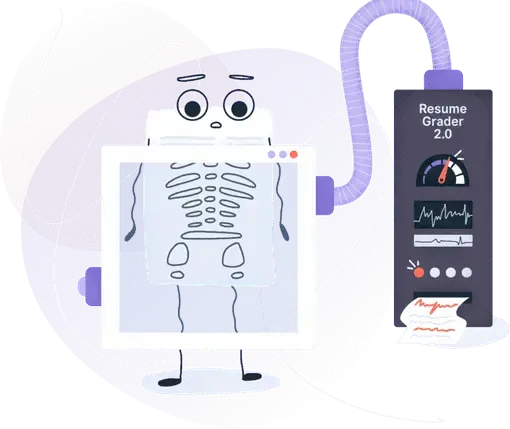Quality Management Skills: Example Usage on Resumes, Skill Set & Top Keywords in 2025
Including quality management in your resume signals to recruiters your commitment to maintaining high standards and your skill in enhancing operational efficiency. Delve into the guide below for inspiration on refining your resume with synonyms and alternate expressions for your skill set.


Is your resume ATS-friendly?
Drop your resume here or upload a file to find out if the skills in your resume are readable by an ATS.
Quality management is a skill that involves the ability to oversee and improve the creation of products or services to maintain high standards. It involves developing processes, coordinating activities to direct and control an organization with regard to quality, and often employing various methods and techniques like Total Quality Management (TQM), Six Sigma, and ISO standards. Having this skill on your resume can signal to employers that you are capable of consistently delivering good results and committed to customer satisfaction.
Having quality management listed on your resume, however, may not always work in your favor if not backed with concrete examples or relevant experience. Simply stating the skill without providing clear evidence of its application can make this claim feel empty to potential employers. It's more effective to illustrate your experiences with quality management through specific accomplishments or certifications that show you can apply these practices effectively.
In this article, you will learn:
- Drawbacks of adding the quality management skill to your resume without context.
- How to represent your quality management experiences effectively.
- Alternative terms and variations for expressing your expertise in quality management.
Misusage of quality management on resumes
Quality management is a critical skill set that many candidates feature on their resumes, but it often gets misrepresented due to exaggeration or misunderstanding of its application. A well-crafted resume should accurately reflect the ability to maintain high standards of work while efficiently identifying and addressing areas for improvement. Misrepresenting this skill can diminish your credibility and hinder your job search.
Examples of misusing quality management skills on your resume:
- Summary Section: Claiming "Expert in total quality management with flawless record in eliminating defects and enhancing efficiency across multiple industries," can raise red flags as it implies an unrealistic level of perfection and lacks specific context.
- Experience Section: Including a bullet point like "Oversaw quality management tasks" is too vague and fails to convey the specifics of your role or accomplishments within quality management.
- Achievements Section: Stating "Solely responsible for revolutionizing company quality standards," can come across as overconfident and does not provide tangible evidence of teamwork or actual results stemming from your efforts.
How to demonstrate quality management skills on your resume
- Highlight your certifications in quality management systems such as ISO 9001 or Six Sigma to show formal training and expertise in maintaining high standards.
- Detail specific quality-related projects you have led or contributed to, emphasizing your role in improving processes, reducing errors, or saving costs.
- Use quantifiable achievements, like percentage improvements in product quality or reductions in customer complaints, to demonstrate the impact of your skills.
- Discuss your experience in developing and implementing quality control procedures, including any audits or assessments you have conducted to assess their effectiveness.
- Include any experience with training or leading teams in quality initiatives, showcasing your ability to guide others in maintaining excellence in their work.
Example 1: Demonstrate quality management in the experience section
- •Spearheaded the development of a new testing protocol that reduced defects by 30% within the first year of implementation.
- •Managed and trained a team of 12 QA analysts, increasing team efficiency by 20% through strategic planning and resource allocation.
- •Implemented a continuous improvement program that led to a 15% reduction in customer complaints and return rates over two years.
- •Collaborated with cross-functional teams to analyze workflows and reduce process bottlenecks, increasing overall throughput by 25%.
- •Conducted comprehensive reviews and audits of client's manufacturing processes, leading to improvements in compliance metrics by 18%.
- •Established a project monitoring system that tracked performance indicators, resulting in a 10% uplift in project delivery timeliness.
- •Directed the revamp of inventory management system to minimize waste, cutting excess inventory costs by 22% within a fiscal year.
- •Achieved a 95% on-time delivery rate through the restructuring of supply chain logistics and reinforcement of vendor relationships.
- •Championed the adoption of energy-saving initiatives throughout the company's facilities, saving an estimated $50,000 annually on utility costs.
- Vivid details and specific numbers in this example provide clear evidence of how the applicant made a positive impact in their roles.
- Describing the scope of responsibilities, such as leading a team or revamping a system, clearly outlines leadership abilities and initiative.
- Highlighting improvements, such as reduced defects or increased efficiencies, shows a clear understanding of what matters in quality management.
- Focus on outcomes like cost savings, customer satisfaction improvement, and higher on-time delivery rates directly correlate job tasks with business success.
- Using a mix of different situations, from leading teams to enhancing processes, displays versatility and a broad understanding of the role quality management plays in various contexts.
- Writing in a readable, straightforward style without excessive jargon makes the candidate's experience accessible to hiring managers without specialty in quality management.
Example 2: Demonstrate quality management in the summary section
- Opens with a clear indication of experience level, hinting at a seasoned professional.
- Demonstrates commitment to quality without resorting to overused phrases.
- Highlights practical skills in process optimization, hinting at proficiency in improving systems.
- Presents concrete evidence of success, a 150% increase in customer satisfaction, which validates claims of expertise.
- Mentions the application of advanced technology to elevate quality control, showing knowledge of relevant tools and systems.
- Structured to offer a narrative of growth and achievement, focusing on results and value brought to previous employers.
- Combines factual data with a personal touch, maintaining professionalism and readability.
Example 3: Demonstrate quality management in the achievements section
- The example clearly illustrates the applicant's effectiveness in enhancing productivity and minimizing waste.
- It presents concrete figures that are the result of the applicant's actions, such as percentages to quantify improvements.
- The achievements are based on real work experiences and scenarios, making them relevant and credible.
- Including a variety of outcomes, like improved customer satisfaction and client retention, shows a range of impact.
- The language used is simple and clear, making it accessible for readers at any level.
What are the relevant certifications for quality management skills on resume
Secure your place in the quality management field with these respected credentials:
The top 5 certifications for gaining quality management skills expertise:
Top skills people add together with quality management skill on resume:
ISO 9001
Process Improvement
Risk Management
Project Management
Statistical Analysis
Continuous Improvement
Auditing
Six Sigma
Lean Management
Regulatory Compliance
Attention to Detail
Problem-Solving
Leadership
Communication
Organizational Skills
Time Management
Adaptability
Teamwork
Decision Making
Critical Thinking
Analytical Skills
Most relevant jobs for quality management skills
- Quality Assurance Manager – Oversees processes to maintain product excellence and customer satisfaction.
- Quality Control Inspector – Checks the quality of incoming and outgoing materials or products, as well as production procedures.
- Quality Engineer – Develops systems to ensure products meet industry standards and customer requirements.
- Process Improvement Specialist – Analyzes and improves organizational processes to increase efficiency and quality.
- Supply Chain Manager – Manages procurement, production, and distribution, focusing on quality and efficiency.
- Operations Manager – Ensures optimal operational processes while adhering to quality standards.
- Project Manager – Plans, initiates, and manages projects, guaranteeing that quality objectives are met.
- Regulatory Affairs Specialist – Ensures that products comply with all regulations and standards in their sector.
- Continuous Improvement Manager – Leads initiatives to improve products and processes continuously.
- Customer Relations Manager – Addresses customer needs and feedback, maintaining high-quality service standards.
Key takeaways
- Quality management skill is crucial for enhancing resumes by demonstrating the ability to maintain standards in products and services.
- Avoid misusing quality management skills by not overemphasizing or misrepresenting your experience level.
- Showcase your skill in quality management on your resume by providing specific examples of past successes and relevant certifications.
Make one that's truly you.




